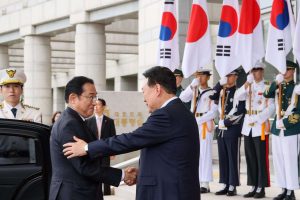On December 14, the South Korean National Assembly passed a resolution to impeach President Yoon Suk-yeol. As a result Yoon’s presidential authorities have been suspended, and depending on the subsequent ruling of the Constitutional Court, which must decide on the impeachment, he could be definitively ousted from power.
The political turmoil in Seoul is having immediate effects on South Korea’s diplomatic and security relations with Japan, which had experienced a dramatic turnaround under Yoon. The de facto incapacitation of the South Korean government has halted the “shuttle diplomacy” between the two countries: Former Prime Minister Suga Yoshihide and Defense Minister Nakatani Gen’s visit to South Korea during December has been canceled and Prime Minister Ishiba Shigeru’s expected visit next January is clouded by doubt.
Amid the turmoil in South Korea, Japan has opted to take a wait-and-see approach. One high ranked official from the Ministry of Foreign Affairs was quoted by Nikkei as saying bluntly that “Japan should not openly communicate with them [South Korea] now,” implying that it will be wise for Japan to restart government-to-government interaction once a new South Korea government gets back on its feet. Once the Constitutional Court makes its ruling, either Yoon will be restored to office or he will be removed from office, triggering a new presidential election within 60 days.
Although there are deep uncertainties regarding how events will transpire in Seoul, in Japan there is a general feeling of where things are headed – and the forecast is usually grim.
Since Yoon’s declaration of martial law set in motion the events leading to his impeachment, Japanese media have been airing concerns about South Korea’s possible “foreign policy shift” under a new president that is hostile to Japan. If Japan takes Lee Jae-myung – the leader of South Korea’s main opposition, the Democratic Party – at his own words, that hunch is likely to be a reality. Lee, the “heavy favorite” to succeed Yoon, is seen as a politician that is overtly “anti-Japan.”
In the past, following the trade restrictions that Japan imposed on South Korea, Lee called Japan a “hostile nation,” a comment that he justified by saying that his country had to keep an eye on Japan due to its imperial past. After Yoon took office, Lee again questioned whether Japan should be seen as a “friendly nation.” He also criticized efforts to have the South Korea-U.S. military alliance coordinate with Japan – effectively refuting the need for institutionalized trilateral security cooperation, which is perceived as one of Yoon’s main legacies.
On top of Lee’s past comments about Japan, his party’s support for the first impeachment motion, which included criticisms toward Yoon’s foreign policy, didn’t help soften the opposition leader’s image in Japan. The concluding paragraph of the first resolution to impeach Yoon – which failed in the National Assembly due to a boycott by Yoon’s party – seems to imply that the Japan-South Korea rapprochement that Yoon initiated was a serious mistake that was itself grounds for impeachment:
In addition, under the guise of so-called value diplomacy, [President Yoon Suk-yeol] has neglected geopolitical balance, antagonizing North Korea, China, and Russia, adhering to a bizarre Japan-centered foreign policy, and appointing Japan-oriented individuals to key government positions, thereby causing isolation in Northeast Asia and triggering a crisis of war, abandoning its duty to protect national security and its people.
The paragraph was widely reported by the national media in Japan, causing serious concerns. However, it was erased – reportedly based on Lee’s request – from the second impeachment motion, which passed the National Assembly on December 14.
Lee and other opposition party members frequently criticized Yoon for ignoring or downplaying issues related to Japan’s colonial legacy and wartime conduct. If a future President Lee resurfaces these historical debates and makes them the focal point in Japan-South Korea relations, the issues that Yoon prioritized – collaborative efforts to counter the assertiveness of China and North Korea – are destined to take a back seat. Thus, Japan is increasingly concerned by the prospect of a Lee presidency, which will likely derail the progress made under Yoon.
Japan has a strong sense of deja vu. South Korea’s former President Moon Jae-in – who also took office following impeachment proceedings against his predecessor – similarly scrapped progress made in Japan-South Korea relations. Moon did not follow through in implementing the “final and irreversible settlement” on the “comfort women” issue and threatened to cancel a deal governing the sharing of secret military information with Japan. With that recent history in mind, Japan fears that President Lee would also abrogate promises made by the Yoon government, ushering the bilateral relations into a “winter period.”
Whoever the next South Korea president is, he or she should recognize that they will be judged by the Japanese people according to the standard that Yoon has set. There is no appetite among the Japanese to listen to lectures on the alleged crimes that were committed under Japan’s colonization of the Korean Peninsula, since Japan’s official position is that they fulfilled all their obligations under the treaty that established diplomatic relations with South Korea in 1965 (a treaty that will turn 60 next year). The fact that Yoon did not discuss history at all in a way that incriminated Japan will also play a part in Tokyo’s uneasiness to face the issues that has divided two nations for close to 80 years.
The tone of coverage and commentary coming out of Japan – highlighting fear of retribution rather than remorse – shows that Japan is not ready to offer the sort of concessions Lee would like to see. Japan will likely struggle to adapt to the changed nature of its relations with its closest neighbor.

































